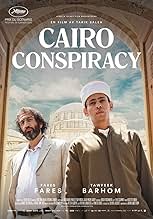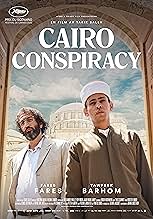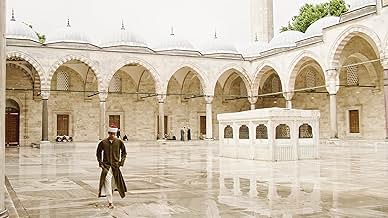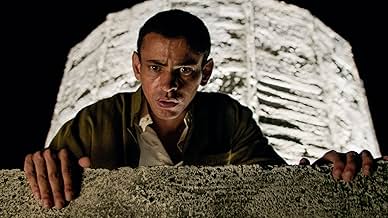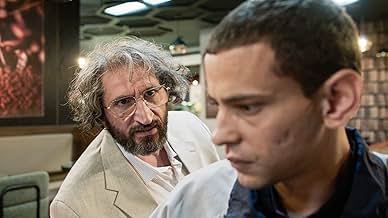Au premier jour de retour après les vacances d'été, le grand imam s'effondre et meurt devant ses étudiants dans une prestigieuse université du Caire. Cela marque le début d'une bataille d'in... Tout lireAu premier jour de retour après les vacances d'été, le grand imam s'effondre et meurt devant ses étudiants dans une prestigieuse université du Caire. Cela marque le début d'une bataille d'influence impitoyable pour prendre sa place.Au premier jour de retour après les vacances d'été, le grand imam s'effondre et meurt devant ses étudiants dans une prestigieuse université du Caire. Cela marque le début d'une bataille d'influence impitoyable pour prendre sa place.
- Récompenses
- 5 victoires et 21 nominations au total
Mohammad Bakri
- General Al Sakran
- (as Mohamad Bakri)
Makram Khoury
- Blind Sheikh Negm
- (as Makram J. Khoury)
Ahmed Laissaoui
- Raed
- (as Ahmed Lassaoui)
Hassan El Sayed
- Village Imam
- (as Hassan El-Sayed)
Avis à la une
10theowest
Why the name change?
Anyway, the experience was absolutely beautiful. Seeing this at the premiere in Sweden where the director/writer Tarik Saleh could further explain his personal motivations and ideas around the story just made it so much special and as a Swede, I'm happy to see the culture of my Arabic neighbours being represented in such a masterfully crafted way. I could get the vibe of how a western film tells a story but also delve deep into a trance-like state for what family, tradition, symbolisism and religious perspectives and experiences are like.
The genre is of the captivated and serious kind, but also of the holy, which suits its original film title. Great casting, cinematography, pacing and story. I thoroughly enjoyed this movie.
I hope to see a lot more cultural representation from the middle east and collaborations in Sweden in the future. This might just be a really good taste of what's to come.
Anyway, the experience was absolutely beautiful. Seeing this at the premiere in Sweden where the director/writer Tarik Saleh could further explain his personal motivations and ideas around the story just made it so much special and as a Swede, I'm happy to see the culture of my Arabic neighbours being represented in such a masterfully crafted way. I could get the vibe of how a western film tells a story but also delve deep into a trance-like state for what family, tradition, symbolisism and religious perspectives and experiences are like.
The genre is of the captivated and serious kind, but also of the holy, which suits its original film title. Great casting, cinematography, pacing and story. I thoroughly enjoyed this movie.
I hope to see a lot more cultural representation from the middle east and collaborations in Sweden in the future. This might just be a really good taste of what's to come.
I like it when films shake the foundations of real life supremacy, this film is one of them. The subject matter is a hot topic and a very controversial one, which is why Tarik Saleh, the filmmaker, is persona non grata in Egypt, and the film was shot in Turkey although it is meant to portray the Azhar Mosque.
This is the story of Adam, the son of a fisherman who gets a letter of approval from the Azhar mosque to join their ranks, coincidentally the Imam. Trouble is brewing in the heels of appointing the next Imam!
This is a well made film with a well-made screenplay and memorable performances from the lead actor.
This is the story of Adam, the son of a fisherman who gets a letter of approval from the Azhar mosque to join their ranks, coincidentally the Imam. Trouble is brewing in the heels of appointing the next Imam!
This is a well made film with a well-made screenplay and memorable performances from the lead actor.
Tarik Saleh put his hand on a timeless aspect of Egyptian politics: the power interplay between the political leaders (the military) and the religious figures (Al Azhar). Never has this sensitive issue been addressed before. Which is ironically the very reason why this movie fails.
The reason why this issue was not addressed by Egyptian cinema (or "Hollywood-sur-Nil" as some used to call it back in its glamorous days) is simple: censorship. Egyptian moviemakers and actors would not be allowed to talk about this taboo. Indeed, this movie will not be played in Egyptian cinemas.
The direct consequence is that only foreign moviemakers can get away with making a movie that tackles this sensitive issue. And this is where things go wrong.
The movie - understandably - fails to capture any Egyptian essence. Dialogues are unnatural. Characters and attitudes are artificial. Add to this the fact that the cast is virtually Egyptian-free (for the reasons described above). They are therefore incapable of smoothing the dialogues into something that feels more natural.
While Tarik Saleh is from Egyptian descent, it is obvious from this movie that his relation to Egypt is, alas, too tenuous to make a movie that delves so deep into Egyptian social, political and religious realities.
Nevertheless, I am aware that my issue with this movie will only be shared by the Egyptian public. Therefore, to the extent that Tarik Saleh considers Boy from Heaven to be a a picture about Egypt by foreign filmmakers to foreign viewers, I would cut him some slack.
Still, the movie is riddled with espionnage clichés. Whichever you can think of, you will find in Boy from Heaven. Egyptian classical music is played at unlikely places. Scene transitions are often abrupt, evidencing issues with the montage.
More than once, the movie did feel like an average film school student's graduation project.
The reason why this issue was not addressed by Egyptian cinema (or "Hollywood-sur-Nil" as some used to call it back in its glamorous days) is simple: censorship. Egyptian moviemakers and actors would not be allowed to talk about this taboo. Indeed, this movie will not be played in Egyptian cinemas.
The direct consequence is that only foreign moviemakers can get away with making a movie that tackles this sensitive issue. And this is where things go wrong.
The movie - understandably - fails to capture any Egyptian essence. Dialogues are unnatural. Characters and attitudes are artificial. Add to this the fact that the cast is virtually Egyptian-free (for the reasons described above). They are therefore incapable of smoothing the dialogues into something that feels more natural.
While Tarik Saleh is from Egyptian descent, it is obvious from this movie that his relation to Egypt is, alas, too tenuous to make a movie that delves so deep into Egyptian social, political and religious realities.
Nevertheless, I am aware that my issue with this movie will only be shared by the Egyptian public. Therefore, to the extent that Tarik Saleh considers Boy from Heaven to be a a picture about Egypt by foreign filmmakers to foreign viewers, I would cut him some slack.
Still, the movie is riddled with espionnage clichés. Whichever you can think of, you will find in Boy from Heaven. Egyptian classical music is played at unlikely places. Scene transitions are often abrupt, evidencing issues with the montage.
More than once, the movie did feel like an average film school student's graduation project.
When the elderly Grand Imam of Cairo's prestigious Al-Azhar University passes away suddenly, a scramble ensues over the appointment of his replacement, one that involves the maneuverings of various vested interests from religious fundamentalists to political pragmatists to devoutly spiritual purists. But who will ultimately take over? That depends on the efforts of a young new student who becomes caught up in this power struggle, the pious son of a fisherman who's unwittingly recruited as a state security informant to infiltrate a group of academic ideological extremists. This slowburn thriller (sometimes a little too slow for its own good, especially in the middle) draws on this scenario to examine the diverse dynamics of Egyptian politics and religion, especially the often-tenuous relationship between the two, as played out through the internal (though publicly high-profile) workings of this long-established, well-respected educational institution. Writer-director Tarek Saleh's latest is a finely acted, capably made production (a noteworthy accomplishment given that the controversial filmmaker's work had to be shot outside of Egypt), though it occasionally lacks the gripping tension needed to give the picture's narrative the kind of dramatic heft that an offering like this requires, especially considering the high stakes involved in this story. While this Cannes Film Festival award winner for best screenplay is a work of fiction and said to poignantly reflect the prevailing conditions found in these institutions, the script, pacing and overall tone could have stood to be less subtle and more pointedly compelling. Indeed, "Cairo Conspiracy" is a suitably attention-holding watch with a solid underlying premise, but it would have been better if it had been a little less conventional and wielded a more pronounced edge.
Fresh from a viewing of "The Nile Hilton incident", watching "Boy from heaven" consolidates the prowess of Tarek Saleh as a filmmaker: a robust and sensational story coupled with a minimalistic yet ever developing sense of flashy cinematography. This review is probably going to end up being a comparison between Saleh's newest film and his previous, so let's get the latter out of the way: "The Nile-Hilton incident" is a thriller crime film deeply rooted in the depiction of an Egyptian society that is on the brink of an Arab spring revolution. The story follows Fares Fares' character, a deeply corrupt cop who is assigned an investigation into a shady hotel murder that turns his life upside down. There are undoubtedly two things that should be said about this film: firstly, the story is pretty good! It is used as an apparatus to unravel the complexities of an Egyptian society in spiral, laden by crime, poverty and police corruption. However, a second point must be raised: the film lacks the kind of artistic and technical passages that tickle the imposter snob in me. It is very plainly shot and that can be said about hundreds of great films, but fortunately not about "Boy from heaven".
I never thought a red turban could have ever been this beautiful. This movie really superseded my expectations in terms of the cinematography while maintaining a solid loyalty to its great story. The film follows a young and candid young man who is chosen to enrol in the Azhar institute: an Islamic studies school that is regarded as a beacon of Islamic sciences in the middle east if not the world. But it is soon understood that this highly coveted institute hides behind it may dark secrets and political conflicts that rival in ruthlessness those inside the Egyptian quasi dictator regime. And Tawfeek Barhom's character finds himself in the middle of this highly volatile and dangerous battle between religion and state.
In this film, Tarek Saleh worked the religious imagery and the beauty of the spiritual ritual in a way that reminded me of Paolo Sorrentino's "The Young Pope": they both depicted in high detail the serenity of the religious system as well as its terrifying rigour. And Saleh got a few great shots of some red hats! Tarek Saleh has caught the eye of the international cinema community for quite a while, but now has cemented himself as one of the best directors in Egyptian cinema.
I never thought a red turban could have ever been this beautiful. This movie really superseded my expectations in terms of the cinematography while maintaining a solid loyalty to its great story. The film follows a young and candid young man who is chosen to enrol in the Azhar institute: an Islamic studies school that is regarded as a beacon of Islamic sciences in the middle east if not the world. But it is soon understood that this highly coveted institute hides behind it may dark secrets and political conflicts that rival in ruthlessness those inside the Egyptian quasi dictator regime. And Tawfeek Barhom's character finds himself in the middle of this highly volatile and dangerous battle between religion and state.
In this film, Tarek Saleh worked the religious imagery and the beauty of the spiritual ritual in a way that reminded me of Paolo Sorrentino's "The Young Pope": they both depicted in high detail the serenity of the religious system as well as its terrifying rigour. And Saleh got a few great shots of some red hats! Tarek Saleh has caught the eye of the international cinema community for quite a while, but now has cemented himself as one of the best directors in Egyptian cinema.
Le saviez-vous
- AnecdotesA few days before the shooting in Egypt for Le Caire Confidentiel (2017) was supposed to take place, director Tarik Saleh was publicly removed from the country and told not to come back. As a result, that movie was shot in Casablanca, Morocco. As he's still persona non grata in Egypt, he couldn't shoot La conspiration du Caire (2022) there, thus despite being set in Cairo, the film was actually shot in Istanbul, Turkey, mostly in the Süleymanye mosque.
- ConnexionsFeatured in Il était une fois...: La conspiration du Caire (2024)
Meilleurs choix
Connectez-vous pour évaluer et suivre la liste de favoris afin de recevoir des recommandations personnalisées
- How long is Cairo Conspiracy?Alimenté par Alexa
Détails
- Date de sortie
- Pays d’origine
- Sites officiels
- Langue
- Aussi connu sous le nom de
- Boy from Heaven
- Lieux de tournage
- Sociétés de production
- Voir plus de crédits d'entreprise sur IMDbPro
Box-office
- Budget
- 6 500 000 € (estimé)
- Montant brut mondial
- 4 867 691 $US
- Durée
- 2h 6min(126 min)
- Couleur
- Mixage
- Rapport de forme
- 2.39 : 1
Contribuer à cette page
Suggérer une modification ou ajouter du contenu manquant


